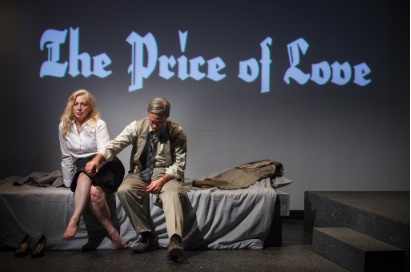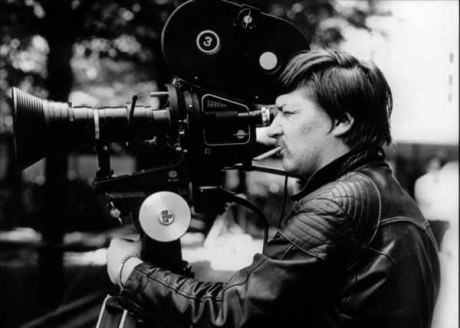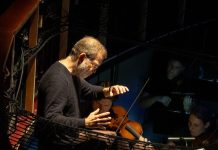From Fassbinder to Scena Theatre: ‘The Marriage of Maria Braun
Survival, security, and success – What would you do to fulfill your life’s ambition? For Maria Braun, the heroine of The Marriage of Maria Braun, the answer is clear. The means to achieving those goals are not so simple. Who is Maria Braun, and is the drive for an idealized life worth the cost?
“Only if you’ve known unhappiness, do you still have hope,” says Maria Braun.

Photo by Mike Foster.
Kicking off its 26th season with artistic passion and a minimal set design, Scena Theater presents The Marriage of Maria Braun, an international epic tale and the rare stage adaptation of the1979 masterpiece film by Rainer Werner Fassbinder. A scintillating drama of love, lost, loneliness, and lust, the production focuses on one West German woman, Maria Braun, who faces the challenges of WWII, the delicacies of commitment, and the focused quest to improve her station in life. A landmark in German Cinema and an international box office success, The Marriage of Maria Braun is also a political film.
A rebel with a cause, like all great filmmakers, Fassbinder had something to say, and The Marriage of Maria Braun is his highly political opinion of the downside of West Germany’s postwar economic miracle. Alienated characters, oppression, and the effects of societal influence are repeated Rainer Werner Fassbinder film themes.
Tonight, one final performance remains of this incredible production – perhaps a once in a lifetime experience of Scena Theatre’s impressive staging of The Marriage of Maria Braun.
Scena Theatre’s co-founder and Artistic Producing Director, Robert McNamara’s specialization in modern German playwrights and the German “New Wave” exemplifies the unique and authentic international productions that Scena Theatre produces. His vast expertise also extends to the world of reknown German filmmaker Rainer Werner Fassbinder. McNamara’s connected insight with the filmmaker has led him to produce three Fassbinder works in the past. In 1989, Scena’s second season, he staged “Bremen Freiheit,” (“Bremen Coffee”), with founding company member Kerry Waters. He’s also staged “Katzelmacher” (“Cock Artist”), and “The Bitter Tears of Petra von Kant” (in Ireland).
The 70s gave rise to an explosion of innovation and growth in the New German Cinema. Renowned filmmakers of the era include Wim Wenders, Werner Herzog, Margarethe von Trotta, Volker Schlöndorff, and Rainer Werner Fassbinder. The Marriage of Maria Braun is not Fassbinder’s most personal film, but no film of the New Wave German Cinema had greater impact on world cinema at the time of its release. Fassbinder’s prodigious output completed 44 projects between 1966 and 1982, and The Marriage of Maria Braun is one of few Fassbinder films where he entrusted others (Pea Frohlich and Peter Marthesheimer) to write the screenplay.
The Marriage of Maria Braun begins with a civil wedding.The year is 1945, and from the opening black and white images of Hitler and war, as a haunting German song plays in the background, the tone is set for the epic tale that spans a decade. The sharp editing and visual poetry of the video images by Scena Theatre’s Projections Designer, TW Starnes, are ingenious storytelling devices McNamara uses to open the theatrical production.
The wedding ends as soon as it begins, with the bomb blast interruptions familiar to Germany in World War II. But for a marriage that is destined, the rush and crumbling skies don’t prevent the determined Maria Braun from marrying her beloved Hermann and ensuring that the license is validated by the Wedding Officiant. This opening act in both the film and the stage production set the tone of the times and give insight to the character’s optimistic drive and audacious confidence.
Maria Braun is a woman of confidence.
Maria and her husband are together “half a day and a whole night” before he is sent off to war.
Early in the tale, Maria expresses her dignity and self-confidence when she confronts a rude soldier who insults her. Her stern, rebuke of the man forces a concession and a swift apology.
Maria Braun is a proud woman. A woman, no matter her background or class status, who doesn’t allow others to defile nor define her.
Maria Braun is a woman of pride.
Loyalty is an attitude, and attitude is everything. Maria Braun’s strong will and resolve rule the day. There is a scene in The Marriage of Maria Braun when she asks her doctor, a trusted family friend, why he never inquires about her husband away at war. The doctor’s doubts about her husband’s survival are his alone. Maria’s quick retort signifies her defiant, remarkable attitude, “You don’t have to believe that he’ll come back, it’s enough that I know that he will,” she says. It’s her steel will and the ability to move forward true to her beliefs that are essential qualities of Maria Braun’s existence.
Maria Braun is a woman of loyalty.
War always means sacrifice, struggle, and loss. As the years pass – without word from her husband – being cold, hungry, and the overall growing despair of life has become routine. Maria is a woman looking for change. “Something has to happen,” she says in the film. Tenacity is an action. As she awaits her husband’s return, Maria purchases a black dress “for work” and she begins working at the Kiss Kiss bar to help make ends meet.
Maria Braun is a woman of tenacity.

Soon after she begins work, she is told by her brother-in-law, who has return from the Front, that her husband is dead. “Forgetting the past for the sake of moving to a brighter future” is a Fassbinder sentiment expressed repeatedly in his film work. Maria appears to recover quickly from her loss, and continues to work and provide for her family. She meets a black American GI, and eventually settles in with him. Sgt. Bill teaches her the invaluable skill of a second language, English, that will forever change her life trajectory. And, then a miracle happens. Her husband Hermann Braun returns …
What happens for the second half of the play and the film is not easily predicted. On this inspired journey, we see Maria Braun climb her way to acquire wealth, responsibility, and a semblance of power. Maria Braun as a character is a victim of contradiction. Her brash, business savy, “cold” climb to control in her life could be seen as unsympathetic, but in truth, Maria is a heroine. Hanna Schygulla in the film, and Nana Ingvarsson’s Scena Theatre performances are both definitive portraits of Maria Braun. Maria is a driven woman, living in a man’s world, and she is willing to do whatever it takes to make a success of herself and her life.
In the film, Schygulla in the lead role gives a magnificent, career-changing performance as a vulnerable young woman who becomes a self-confident, independent, and an evolved survivor. (Schygulla, a Fassbinder films staple, followed The Marriage of Maria Braun with lead roles in the next two titles of his BRD trilogy Lola (1981) and Veronika Voss (1982). (“BRD” stands for Bundesrepublik Deutschland, the official name of West Germany and of the united contemporary Germany).
Nana Ingvarsson’s approach to the role is a more nuanced one and seizes on the intimate theater experience to connect with the audience. The accessible interpretation of her character, expressed with knowing looks, moments of humor, and the use of telling physicality are exceptional; the memorable storytelling methods expose all of Maria Braun’s layers.
Ingvarsson excels at illuminating a three-dimensional view of this woman, providing a realism and authenticity to the Maria Braun character. Ingvarsson enlivens the humanity of Maria Braun, making her more than a cliche or philosophical voice piece. She delivers a line that perfectly encapsulates her portrayal, “Great love is a great emotion and great truth.”
The breathtaking, explosive ending in The Marriage of Maria Braun will make your heart skip a beat. Robert McNamara, I believe has thrown in a twist with intention and as such has put his theatrical signature on the powerful ending. You’ll be talking about the meaning for days!
Must a woman be a man’s equal? This challenging question is the recurring theme that haunts Maria Braun and the men and women she encounters. In the Fassbinder film there is a scene that the question is directly asked by her ex-brother-in-law, and by this point nothing Maria does surprises the audience. “Yes of course,” she replies to the question, “Except most men don’t have that consciousness. Human consciousness lags behind real development.” That statement says it all to describe who Maria Braun is, and one reason of many, why Maria Braun is a feminist heroine and a memorable iconoclast.
Maria Braun is a woman of her time – a woman of all time.
You owe it to yourself to do whatever you can do to make it down to H Street tonight. See the Scena Theatre performance at 8 pm, and then rent the Criterion DVD of the Fassbinder film.
Scena Theatre: Running Time: One hour and 50 minutes, with no intermission.
Fassbinder film on DVD: Two hours.
The Marriage of Maria Braun ends its run tonight Oct. 11, 2013 at the Atlas Performing Arts Center in Lab Theatre II- 1333 H Street NE, Washington D.C. Tickets are available at 202-399-7993 or here.
LINK:
DCMTA review.





